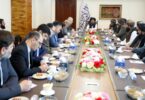Elizabeth Blade
Those options include purchasing weapons from other providers including India, Russia, and South Korea as well as establishing a joint front with Israel, in a kind of Middle East NATO that would help to combat the region’s multiple challenges.
While Israel’s Prime Minister Benjamin Netanyahu finally received his phone call from US President Joe Biden on Thursday, Saudi Arabia’s leaders are still waiting for their turn. The catch is that it might not be coming any time soon. Washington has already stated that it will not place a call to Crown Prince Mohammed Bin Salman (MBS) and that President Biden will adhere to a “peer-to-peer” policy, talking to his father, King Salman, instead.
A Bad Start: For Ahmed Al Ibrahim, a Riyadh-based political analyst, the attitude of the new administration in Washington is a “bad start” and he says the elites of Saudi Arabia are “alarmed” at the course relations are taking.
“The intelligence and de-fence establishment in Wa-shington understands the importance of having Saudi Arabia as America’s ally”, said Al Ibrahim, referring to the phone call between Defence Secretary Lloyd Austin and MBS several days ago where he reiterated his country’s commitment to regional security.
“But the deeds of their State Department contradict what the defence establishment is trying to secure. And what they’re doing is to act to downgrade our relations”. It is not really clear what’s behind that decision to “downgrade” those ties. Part of the reason could be Saudi activities in Yemen against the Houthi rebels that Washington no longer regards as a terrorist group. Or it could be the alleged violations of human rights in the Kingdom that triggered the administration’s harsh response.
“Their actions are hypocritical. The US has been violating the human rights of their own people. Their police officers are killing black people, they persecute Hispanics. They cannot preach to us about hum-an rights. For them it is just a tool to twist our arms”. This is why Al Ibrahim doesn’t buy the excuse of Riyadh’s purported human rights abuses and believes the real reason behind Was-hington’s decision to recalibrate relations with the Ki-ngdom can be found elsewhere, specifically in their desire to create “manageable chaos” and to “stre-ngthen the scare of Iran”.
Riyadh doesn’t hide that it is concerned with its northeastern nighbour. It’s not only their controversial nuclear programme that bothers the authorities in Saudi Arabia. It’s also their ballistic missiles that can reach deep into the nation that present a challenge to the Saudis, although Tehran has repeatedly stressed that its nuclear ambitions are for peaceful purposes only and that its missiles are for defence.
Under former President Trump Riyadh felt protected. Not only did he suffocate the Iranian economy with sanctions, but he also made sure to sell Saudi Arabia a number of advanced technologies and weapons. Biden taking office has brought some of those deals to a halt.
Recently, it was reported that Washington had decided to temporarily stop the supply of 7,500 precision-guided bombs to Saudi Arabia, a deal estimated at nearly half a billion dollars, and the US has already stressed that similar contracts will be reviewed too.
Ways Out: Although for Al Ibrahim this and other developments are alarming, he says he has faith his government will find a way out of the current stalemate. One of those “ways out” could be a rapprochement with other major arms suppliers including India, Russia, and South Korea.
“The US knows that the market is open. They can either choose to preserve our relations or we will be looking for other suppliers. There are many other choices”. Another option could be an attempt to forge a closer alliance with Israel, a state that Riyadh doesn’t have formal relations with.
Even though Al Ibrahim doesn’t say it openly, he does suggest that Israel, Saudi Arabia, and a number of other Gulf Cooperation Council countries are working on establishing a joint front — a sort of regional NATO — to tackle a number of common challenges. That union will not only aim to protect its members from the Iranians. It will also shield them from the Iranian “ghost militias” across the region, including Hezbollah in Lebanon and the Houthi rebels in Yemen.
Al Ibrahim says Washington is welcome to join that alliance if it ever sees the light of day. Even though such an alliance may seem unlikely at the moment, he is certain that it is just a matter of time until America reiterates its commitment to Saudi Arabia. “The US is a country of establishment. The Biden administration might steer the ship away but it cannot change course completely. Four years won’t be enough to scrap the friendship and the bond we’ve built for years. So now we need to wait for better days”.






